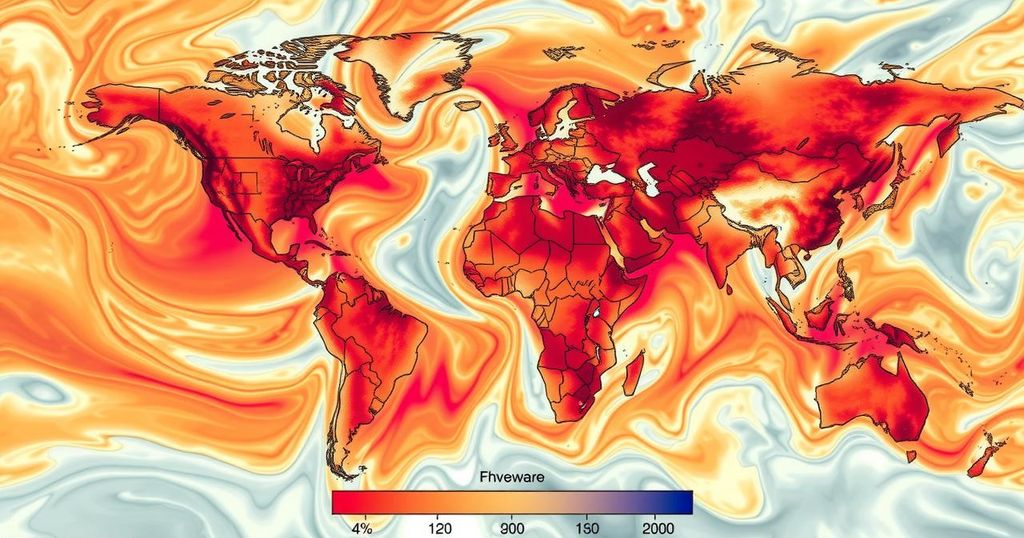Climate Change Causes 41 Extra Days of Dangerous Heat in 2024, Warns Report
Climate change has resulted in 41 additional days of dangerous heat worldwide in 2024, leading to over 3,700 fatalities and millions displaced. The study, conducted by World Weather Attribution and Climate Central, emphasizes the urgent need for global action against fossil fuel use and enhanced climate readiness.
According to a significant report from World Weather Attribution and Climate Central, climate change has resulted in an alarming increase of 41 days of dangerous heat globally in 2024. This year, extreme weather phenomena intensified by human-induced climate change have tragically resulted in over 3,700 deaths and displaced millions across various regions. The analysis highlights the escalating urgency for nations to abandon fossil fuels and prepare for the worsening impacts of climate events in the future.
Dr. Friederike Otto, a leading expert at World Weather Attribution, remarked on the severe ramifications of fossil fuel-induced warming, stating that 2024 has starkly showcased the devastating effects of extreme weather—culminating in significant loss of life and widespread suffering. The report analyzed 29 weather events, discovering that human-induced climate change exacerbated 26 of these incidents, including unprecedented floods, prolonged droughts, and destructive hurricanes.
Particularly devastating was the flooding in Africa, especially in countries like Sudan and Nigeria, where the death toll surpassed 2,000. These trends are projected to worsen, with rainfall events anticipated to become yearly occurrences if global warming escalates beyond two degrees Celsius. Notably, Hurricane Helene, which affected six states in the U.S., was intensified by climate change, with conditions making such severe storms significantly more likely than in the past.
The report also emphasized the threats posed to the Amazon rainforest due to a historic drought, which is now considered 30 times more likely as a result of global warming. Furthermore, Joyce Kimutai from the Centre for Environmental Policy highlighted the unjust consequences facing Africa, which, despite its minimal contribution to global emissions, continues to endure the harsh impacts of climate change.
As millions are exposed to dangerous heat, characterized as temperatures falling within the highest historical percentiles, health risks are significantly heightened. Joseph Giguere of Climate Central indicated that extreme temperatures are becoming increasingly common globally due to climate change. The report calls for urgent resolutions, including a rapid transition to renewable energy, enhanced early-warning systems for weather-related catastrophes, and international financial backing for vulnerable nations to tackle climate change effects.
The authors urge that, with the knowledge and technology at our disposal to transition away from fossil fuels, global cooperation and concerted efforts are essential to mitigate further escalation of these environmental crises. As 2024 is on track to be recorded as the hottest year, the need for a united response to combat climate change has never been more imperative.
The report titled “When Risks Become Reality: Extreme Weather in 2024” by World Weather Attribution and Climate Central assesses the severe consequences of human-induced climate change. It details an observable increase in extreme weather events, including extended periods of dangerous heat, contributing significantly to mortality rates and displacements globally. This analysis underlines the pressing demand for nations to move towards sustainable energy solutions and to enhance preparations for advancing climate challenges.
In summary, the analysis illustrates a stark reality: climate change is intensifying extreme weather events, leading to unprecedented health risks and loss of lives. The findings underscore the critical need for immediate and coordinated global action to mitigate these impacts by transitioning to renewable energy sources and supporting vulnerable nations in adapting to climate change. Without such actions, the frequency and severity of dangerous heat days, along with other extreme conditions, will only increase in the years to come.
Original Source: www.dynamitenews.com




Post Comment